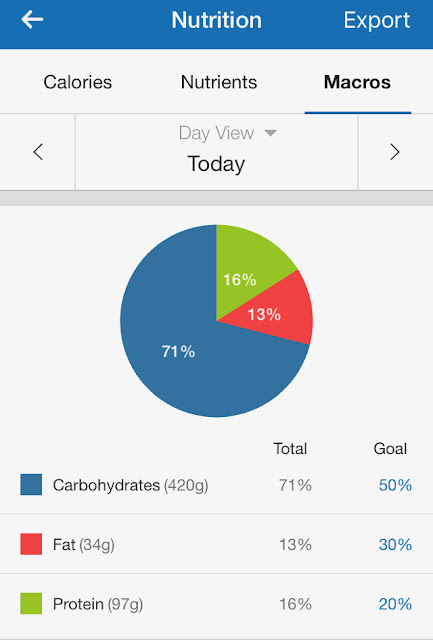Since bringing life back
to my Pierini Fitness blog
the beginning of this year, plenty has been shared about my current fitness,
health and wellness journey, currently a work in progress. This includes nutrition and a goal of lowering
my bodyweight. It has been, for the most
part, a pleasant journey and I now weight over 30 lbs. less than when I
started, although, there have been a few stuck points along the way. This is to be expected as any seasoned and
successful weight-loss person knows.
When entering the
fascinating world of nutrition for whatever goal you have – be in good health, muscle
and strength gains, weight gain or weight loss – all the experts have their
standard prescriptions of the precision eating one needs to do to accomplish
their goals. In sifting through and
deciphering their “killer nutrition plans”, eventually one starts reading about
macronutrients, more commonly referred to as macros.
One explanation of macros
is that they’re the building blocks of nutrition and include calories
(carbohydrate, protein and fat) but also vitamins and minerals. In most nutrition chatter, however, when
macros are mentioned, it’s the relative composition of carbohydrates, proteins
and fats in the calories eaten.
So, for example, if I eat
something that has 321 calories consisting of 40 grams of carbohydrates, 20
grams of protein and 9 grams of fat, its macro composition can be expressed as
50/25/25. The 50/25/25 means that 50
percent of the calories are carbohydrates, 25 percent protein and 25 percent
fat. This is because a gram of carbohydrate
or protein is 4 calories, and a gram of fat is 9 calories. Do the math to see for yourself.
Some middle-aged men
chasing their fitness, health and wellness subscribe to various “killer
nutrition” approaches. Some eat low or
near zero carbohydrates following the popular keto diet. Others eat high carbohydrates following a
starch-based nutrition approach such as that advocated by Dr. John
McDougall. Some take a more balanced
approach getting, for example, 50 percent of calories eaten from carbohydrates
with the remaining 50 percent equally from protein and fat.
Sometimes, in the diet
and nutrition chatter, advocates for each will fiercely argue why their method
is superior to the others. Sometimes
this chatter becomes very intense and mean-spirited, equaling in intensity and
opposition as an atheist and Christian arguing about whether God exists. If you remain in this crossfire, it
eventually can become confusing, overwhelming and unmotivating.
What does Pierini Fitness think
about macros? What macro plan does he
follow in his fitness, health and wellness journey?
In past journeys, I’ve
tried just about all except for the low carb – or keto – approach; it’s not for
me. My body needs carbohydrates to fuel
my daily and fitness training pursuits.
I’ve tested the high carb and low-fat approaches and, of course, a
balanced approach. They all work for me
and provide eating satisfaction, for a while, before shifting among them.
Currently, I don’t pay
attention to macros other than an afterthought at the end of the day after my
nutrition journaling is completed. I
never pay attention to macros for meal planning. Consequently, what I’m finding is that my
macros are all over the place. Case in
point are two days last week.
Here’s a macro
presentation of what I ate last Wednesday, a day that included a chicken
teriyaki rice bowl for lunch and a big filet mignon steak for dinner:
And, here’s a macro presentation of what I ate last Friday, a day that included five boiled potatoes and, honoring my Italian ancestors, a very large bowl of pasta:
These two extremes
coexisting with my continuing weight loss best exemplify that a calorie is a
calorie and eating less calories than you expend, over time, is proven weight
loss, whether you’re loading up on bacon or spaghetti.
Pax Domini sit
semper vobiscum














No comments:
Post a Comment